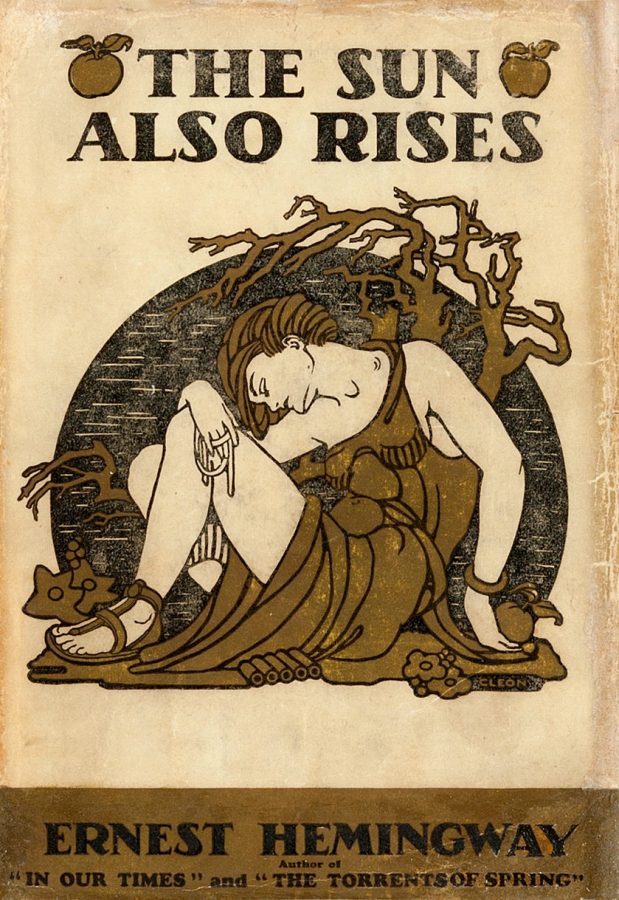Book Review: The Sun Also Rises
May 29, 2020
Published in 1926, The Sun Also Rises is Ernest Hemingway’s debut novel. It depicts a group of American and British acquaintances who travel to the Festival of San Fermín in Pamplona, Spain. The novel is also fraught with allegorical meaning, with many of the character’s traits and sometimes their physical qualities emphasizing Hemingway’s themes and archetypes. Brett represents both the liberated twentieth-century woman, as well as a masculine foil to the impotent and effeminate Jake Barnes. In this review, I will summarize the cursory details of the plot and analyze the novel.
Book One describes the luminous café society of Americans in Paris. It gives exposition on the main characters’ lives as Jake plays tennis with Robert Cohn. Later, he chances upon the beautiful Brett Ashley at a nightclub with the first in a protracted line of men chronicled in the novel. Brett tells Jake she loves him, but they both are aware that she is unable to forgo her profligate ways for him.
Book Two begins as the friends begin to make their way down to Pamplona for the festival. Jake is joined by his friend Bill Gorton and Brett’s third fiancé Mike Campbell. Jake and Bill plan to travel to Bayonne, to fish with Cohn before Brett and Mike arrive. However, Cohn stays in Pamplona to wait for Brett, whom he feels possesive of after a brief affair with her. His obsequious behavior towards her stirs up the ire of the rest of the men on the trip and breeds their resentment of Cohn as time goes on. Mike is especially enraged at Cohn’s jealous nature and begins to taunt him with antisemitic slurs. As he becomes more frustrated, Mike tells Cohn in his most peremptory manner possible that he is not wanted. Hemingway goes to great lengths to establish Brett as benign and forgiving, in contrast to her masculine, aggressive nature. Therefore, her toleration of her future husband’s behavior here appears out of character. However, this is reconciled by the fact that she no longer cares for Cohn, and the ultimate end of her engagement to Mike is to rebuff Cohn’s affections.
As the fiesta begins, the characters continue to drink heavily, watch the bulls, and bicker. In this section, Hemingway demonstrates his passion for the culture of bullfighting known as afición and presents it as a genuine way of life, to be contrasted with the lives of Jake’s friends in Paris. Jake is also demonstrated to possess the characteristics of an aficionado, rare in a non-Spaniard. The owner of the hotel the friends are staying at is aware of Jake’s status as an aficionado and decides to introduce Jake to Pedro Romero, a 19-year old matador who is stays at the hotel with them. Brett becomes enamored with Romero shortly after meeting him and seduces him. As the tension grows between the three men competing for Brett’s affections, they act in increasingly obtuse ways, and all of them fail to see that Brett has fallen for Romero. This culminates in a fistfight between Cohn, Jacob, and Mike. A former champion boxer, Cohn easily overpowers Jake and Mike. He later fights Romero after finding him in Brett’s hotel room, although Romero still performs spectacularly in the bullring. However, Jake’s connection to Brett ruins his social standing in the eyes of the Spaniards, and he leaves there with his reputation in shambles among them.
Book Three depicts the events after the fiesta. Bill returns to Paris, Mike continues a stay in Bayonne, and Jake withdraws to San Sebastián. As he prepares for his trip back to Paris, he receives a telegram from a Brett, who had escaped to Madrid with Romero. He finds a penitent Brett in a cheap hotel room, alone, where she announces her intention to go back to Mike. The book ends as the pair discuss things that could have been. Brett tells Jake they could have had “a damned good time together.” Jake agrees, asking “Isn’t it pretty to think about?”
Critic Carlos Baker writes that through this work, Hemingway conveys his opinion that the Lost Generation, seen as the decadent, complacent, multitude damaged by World War I, is in truth resilient and steadfast. After reading and analyzing the book myself, I find myself in disagreement with this characterization. The characters are broken, depressed people whose many foibles drives the plot, often exacerbating the situations they find themselves in. The protagonist and narrator, Jake Barnes is in love with promiscuous divorcée Brett Ashley. A war injury renders Jake impotent and symbolically serves to attenuate his masculinity, and prevents him from consummating his relationship with Brett.
Jake’s alcoholism, a trait shared by many of the characters of the novel contributes to his depression and self-loathing. However, he is the one who consistently pays the bills when those who can do not. This allegorically makes him the moral center of the story, and additionally identifies him with American values. His unwillingness to face his true feelings for Brett means they never get anywhere meaningful. Critic James Nagel regards the novel a tragedy noting the fact that Jake and Brett’s relationship becomes destructive as it cannot be consummated. Brett’s numerous liaisons inadvertently cause Jake the most harm compared to the price other men pay for her attention. It costs him his friendship with Robert Cohn and decimates his social standing among the Spaniards. But worst of all, Jake loses his honor, faith, and hope. In this way, Hemingway biographer Michael Reynolds is justified in viewing the novel as a morality play with Jake emerging as the one who loses the most.


